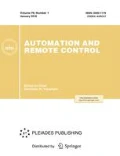Abstract
This paper considers a noncooperative game of several players (governments of neighboring countries) participating in emission reduction trading. A special emphasis is placed on the case of two players, one representing Eastern European countries and the other being the countries of the former Soviet Union. We perform statistical analysis of the model parameters based on real data under quadratic cost functions and logarithmic utility functions. The concepts of a noncooperative Nash equilibrium and cooperative Pareto maxima are introduced and connections between them are established. A new concept, i.e., a market equilibrium, which combines the properties of Nash and Pareto equilibria, is rigorously defined. An analytical solution of the market equilibrium problem is given. This analytical solution can serve for verification of numerical search algorithms. In addition, we propose a computational algorithm of market equilibrium search, which shifts a competitive Nash equilibrium to a cooperative Pareto maximum. The algorithm is interpreted as a repeated auction, where the auctioneer possesses no information about the cost functions and the functions of environmental effect from emission reduction of the participating countries. An auctioneer strategy leading to market equilibrium attainment is considered. From the game-theoretic viewpoint, a repeated auction describes a learning process in a noncooperative repeated game under uncertainty. We compare the results gained by the proposed computational algorithms with their analytical counterparts. And finally, numerical calculations of equilibrium and algorithm trajectories converging to the equilibrium are demonstrated.
Similar content being viewed by others
References
Vorob’ev, N.N., Teoriya igr dlya ekonomistov-kibernetikov (The Theory of Games for Economists-Cyberneticists), Moscow: Nauka, 1985.
Germeier, Yu.B., Igry s neprotivopolozhnymi interesami (Games with Nonantagonistic Interests), Moscow: Nauka, 1976.
Kleimenov, A.F., Neantagonisticheskie pozitsionnye differentsial’nye igry (Non-Zero-Sum Positional Differential Games), Yekaterinburg: Nauka, 1993
Krasovskii, N.N. and Subbotin, A.I., Pozitsionnye differentsial’nye igry (Positional Differential Games), Moscow: Nauka, 1974
Kryazhimskii, A.V. and Osipov, Yu.S., On Differential-Evolution Games, Tr Mat. Inst. Steklov., 1995, vol. 211, pp. 257–287.
Kurzhanskii, A.B., Upravlenie i nablyudenie v usloviyakh neopredelennosti (Control and Observation under Uncertainty), Moscow: Nauka, 1977
Axelrod, R., The Evolution of Cooperation, New York: Basic Books, 1984
Barrett, S., International Environmental Agreements as Games, in Conflicts and Cooperation in Managing Environmental Resources, Pethig, R Ed., Berlin: Springer-Verlag, 1990
Basar, T. and Olsder, G.J., Dynamic Noncooperative Game Theory, London: Academic, 1982
Chander, P. and Tulkens, H., Theoretical Foundations of Negotiations and Cost Sharing in Transfrontier Pollution Problems, Eur. Econom. Rev., 1992, vol. 36, pp. 388–398.
Ehtamo, H. and Hamalainen, R.P., A Cooperative Incentive Equilibrium for a Resource Management Problem, J. Econom. Dynam. Control, 1993, vol. 17, pp. 659–678.
Ellerman, A.D. and Decaux, A., Analysis of Post-Kyoto CO2 Emissions Trading Using Marginal Abatement Curves, Joint Program Report Series, Cambridge: Massachusetts Inst. Technology, 1998, Report no. 40.
Fudenberg, D. and Kreps, D.M., Learning Mixed Equilibria, Games Econom. Behav., 1993, vol. 5, pp. 320–367.
Hoel, M., Global Environmental Problems: The Effect of Unilateral Actions Taken by One Country, J. Environm. Econom. Manage., 1991, vol. 20, pp. 55–70.
Hoffbauer, J. and Sigmund, K., Evolutionary Games and Population Dynamics, Cambridge: Cambridge Univ. Press, 2001
Kaniovski, Yu.M. and Young, H.P., Learning Dynamics in Games with Stochastic Perturbations, Games Econom. Behav., 1995, vol. 11, pp. 330–363.
Krasovskii, A.N. and Krasovskii, N.N., Control under Lack of Information, Boston: Birkhauser, 1994
Kryazhimskii, A.V. and Tarasyev, A.M., Equilibrium and Guaranteeing Solutions in Evolutionary Nonzero Sum Games, IIASA Interim Report IR-98-003, Laxenburg: IIASA, 1998
Maeler, K.G., The Acid Rain Game, in Valuation Methods and Policy Making in Environmental Economics, Folmer, H. and van Ireland, E, Eds., Amsterdam: Elsevier, 1989
Nentjes, A., An Economic Model of Transfrontier Pollution Abatement, in Public Finance, Trade and Development, Tanzi, V, Ed., Detroit: Wayne State Univ. Press, 1993, pp. 243–261.
Nentjes, A., Control of Reciprocal Transboundary Pollution and Joint Implementation, in Economic Instruments for Air Pollution Control, Klaassen, G. and Foersund, F, Eds., New York: Kluwer, 1994, pp. 209–230.
Nowak, M. and Sigmund, K., The Evolution of Stochastic Strategies in the Prisoner’s Dilemma, Acta Applic. Math., 1992, vol. 20, pp. 247–265.
Smale, S., The Prisoner’s Dilemma and Dynamical Systems Associated to Non-cooperative Games, Econometrica, 1980, vol. 48, no. 7, pp. 1617–1634.
Tol, R., The Benefits of Greenhouse Gas Emission Reduction: An Application of FUND, Working Paper FNU-64, Hamburg: Hamburg Univ., 2005
Vasin, V.V. and Ageev, A.L., Ill-posed Problems with A Priori Information, Utrecht: VSP, 1995
Zangwill, W.I. and Garcia, C.B., Pathways to Solutions, Fixed Points, and Equilibria, Englewood Cliffs: Prentice-Hall, 1981
Author information
Authors and Affiliations
Corresponding author
Additional information
Original Russian Text © N.A. Krasovskii, A.M. Tarasyev, 2011, published in Matematicheskaya Teoriya Igr i Priloszheniya, 2011, No. 4, pp. 49–88.
Rights and permissions
About this article
Cite this article
Krasovskii, N.A., Tarasyev, A.M. Decomposition algorithm of searching equilibria in a dynamic game. Autom Remote Control 76, 1865–1893 (2015). https://doi.org/10.1134/S0005117915100136
Received:
Published:
Issue Date:
DOI: https://doi.org/10.1134/S0005117915100136




